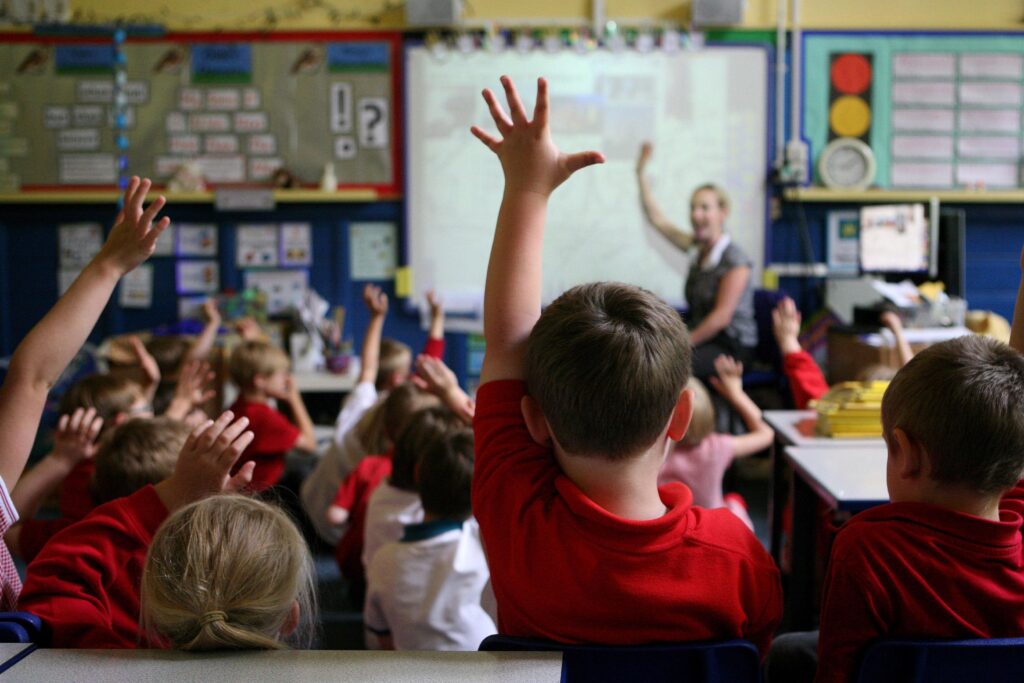Homeschoolers do not need validation from others to educate their children. Every family has their “why” and should be respected in all areas of parenting, including homeschooling.
The uncommon decision to homeschool seems to be of great concern to some. Let’s unpack the three main objections and look at the facts of each one.
#1 Mothers are not qualified teachers; therefore, students won't get a proper education.
This objection centers around the paradigm that knowledge and wisdom are disseminated from an expert.
In some instances, I agree with this concept. Specialized skill sets that require expert training would be playing the piano, ballet, and brain surgery, to name a few. Things most ordinary people haven’t done, and if they want to do them, they need an expert trainer.

Reading, writing, history, and science, are all things most ordinary people have already mastered, or at the very least, have good working knowledge.
The vast majority of mothers who take on the challenge of homeschooling have the education needed to teach their children and the ability to find resources and tools to fill gaps in advanced levels of learning that arise around high school.
Also, the underlying distrust of parents as educators who allow children to lay around and play video games all day is the unusual case where parental problems like depression affect many areas of the child’s life. This distrust is unfounded when analyzing the success rates of homeschooled students.
If public school is so superior, why is there so much worry around its graduates educating primary and secondary school students in the first place?

Unfortunately, the elitism of academics in primary and secondary education is a thorn in homeschooling’s side.
Many good quality teachers are needed for the masses who still chose to defer their right to educate their children to a public institution.
What is not needed is the prejudiced opinions of educators and others that are not helpful, kind, or informed.
From a quick internet search:
People also ask
Is it harder for homeschoolers to get into college?
There’s a common misconception that homeschoolers have difficulty when it comes to getting into college. … In fact, many colleges are now seeking out homeschoolers themselves, as homeschooled students tend to be excellent college students.
Why do colleges prefer homeschooled students?
“Far from being sheltered and shy (the typical stereotypes), homeschoolers’ applications reflect students who have traveled, taken risks, and studied some pretty intense topics,” said Staehle in an article titled “Casting a Wider Net.” “Homeschoolers not only enhance classroom discussions, they tend to get involved in …
Do homeschoolers do better in college?
A new study published in The Journal of College Admission suggests that homeschool students enjoy higher ACT scores, grade point averages and graduation rates compared with other college students. … Homeschool students earned more college credits (14.7) prior to their freshmen year than other students (6.0).
Does Homeschooling look bad to colleges?
Being a homeschooled student can help you stand out to admissions officers – many colleges see homeschoolers as different in a good way from traditional students. The rumor that homeschoolers must obtain their GED to be eligible for financial student aid is untrue – homeschoolers are exempt from this requirement.
Shall I go on?

College admissions is just one area that can be fact-checked to dispel the untrue idea that a mother is not qualified to homeschool.
The proper education, success, and future earning potential of children weigh heavy on the secular world’s scale of success, however.
We Christians know that this is not the definition of success that is meaningful or eternal.

Keep this Book of the Law always on your lips; meditate on it day and night, so that you may be careful to do everything written in it. Then you will be prosperous and successful.
Following the prescriptions written in the Bible (“Basic Instructions Before Leaving Earth”) makes us successful.
Obedience, trust, faith, love, proclaiming the gospel of peace, repentance, and turning from sin to be humbled before our Father in heaven, and glorifying God in our life…these are the markers of success for a Christian.
Not earning money during our lifetime on planet earth. How hollow and unsatisfying.
If that is indeed the expert’s goal in educating our children, then it is not good enough, and we will never agree on the end game.
And that’s OK.
#2 Children won't be adequately socialized unless they are in a public educational setting.
I find this objection silly in a day when the opportunities available to most homeschoolers are so vast that many of them are over-scheduled, over-stressed, and over-stimulated due to the lessons, clubs, events, and community involvement they participate in.
All these activities provide interpersonal interaction and social skills like lining up, being a good audience, taking turns, etc.
Perhaps homeschoolers in very secluded, rural homes find it challenging to engage with the broader community, but this is not commonplace.



Is there a chance that some of the concern revolves around removing children from an institution that is socializing them with the modern cultural standards prevalent in our society today?
Is there worry that these children may not learn about the social movements attempting to control our speech and thought and therefore be “unsocialized” to the standard of progressive liberalists? Hmm.
Is there concern that Biblical concepts of love, forgiveness, grace, and mercy may be the guiding principles of these unsocialized youth? Wouldn’t that be awful!

Homeschoolers know who their children are socializing with and make wise choices that guide healthy, loving, and challenging experiences.
The multi-generational opportunities to interact frequently with others are beneficial and result in mature children who have a broad general knowledge base.
I think this objection may have started to encourage compliance with the institution of public education. When analyzed today, it just doesn’t hold water. Yet, so many are a parrot because they don’t care to educate themselves on homeschooling in a modern era.

I had the pleasure of chaperoning many homeschool proms for ages 13 to 18. Meeting hundreds of these young men and women gave me hope for the future of America!
The attendees were polite, engaging, held lively conversations with each other and adults, and looked marvelous in their fancy dresses and suits! (If you think all homeschool kids are weird, then you probably don’t know many!)
This tired old cliche of an excuse needs to be retired because it just doesn’t make sense anymore.
Let’s move on.


#3 The familiar public system is trustworthy because it is controlled and monitored.
People like things they know and understand. Change is hard and typically causes pushback.
Public school is concrete and follows a set of rules and structure most people have experienced.
Homeschool, on the other hand, is a vague concept where spontaneity is embraced. Each family crafts a unique homeschool; therefore, one size does not fit all, as in public school.
This nebulous place where homeschool lives for many of its objectors is disconcerting to them. Humans like to eliminate discomfort. Much of this is created by unfounded assumptions that form the basis of their opinions.
“Most homeschooled adults who enter the business world have trouble working in this tough environment since they didn’t go to school and have to deal with difficult personalities and situations.”
What data shows most homeschooled adults who enter the business world have trouble working in that environment? Why would homeschooling eliminate dealing with difficult personalities and situations?
This is hogwash.

The regulation and control of public schools are comforting to people, and they believe it is a positive environment for children created by experts with only the best intentions.
Some of these individuals simply do not feel confident that they, or others, could educate a child (see #1). This belief fuels a displacement of education from parents to an institution.
The result of this is the ever-increasing indoctrination of our children with liberal tenets. If you think I’m crazy or exaggerating, you haven’t been assessing the current state of affairs in our educational system.

Indoctrination is the process of teaching a person or group to accept a set of beliefs uncritically. School is the perfect platform because children are not abstract thinkers until between 11-16 years old.
Understanding things like Critical Race theory and transgender issues in an appropriate Biblical context is difficult for adults!
Do you realize that when a child is at the very beginning of the age range when abstract thinking is possible (age 11-12), they have already had 8,000 hours of school? (Starting school at age five and multiplying by 1,000 hours of school a year gets us to this number.)
What is being taught to our young impressionable children for 8,000 hours is essential. Let those numbers sink in for a moment.

I wrote a blog post about my criticism of the public school institution and would encourage you to read it for my in-depth take on this very troubling topic. An open letter to Christian parents of children in public school.
Critics don’t want religion taught in school because they lack the understanding that religion and science are not at odds with each other, but science (which is a religion in secular circles) confirms creation and forms the basis for Biblical Christianity.
They want their religion of science taught as indisputable truth, although it is all based on theories. Christians know the truth is Jesus!
John 14:6
Jesus answered, “I am the way and the truth and the life. No one comes to the Father except through me.

How do we educate apart from the truth? Only fools attempt this.
In addition, flawed humans in Christian settings have hurt people. This hurt is brought into the discussion when children from Christian upbringings are pre-judged to grow up rigid and judgemental and reinforces the public system as a safer option.
I can see right through this to the heart of the hurt individual who says it.
We should all come to the Lord in humble submission to heal the hurts we may have caused and learn how to operate in love as our Father in heaven and bring the gospel of peace to others.

Is the public system trustworthy because it is controlled and monitored? Hardly. It is a system many are comfortable with but has become boldly set against Christian principles.
Even if these principles were the foundation of public education, that would not preclude parents from being good educators of their children.
We do need to validate the adults who were homeschooled and did not have a good experience. Looking at their stories, we can conclude that frequently there was parental depression, other mental health issues, or severe personal problems impacting the homeschool environment.
Always seek a trained therapist, counselor, pastor, or professional if your mental health or personal problems impact you or your children and you need help. This is no different than seeking medical help if you sprain your ankle.
None of the arguments that parents are not qualified to homeschool, children won’t be socialized, or the controlled, monitored public system is trustworthy have validity to them.
I pray as you answer criticisms about homeschooling in love that the ideas shared here will give you new eyes to see the issues and an ability to respond in truth with the facts.
May God bless your homeschool journey, and nothing deters you from this calling in Christ Jesus!
